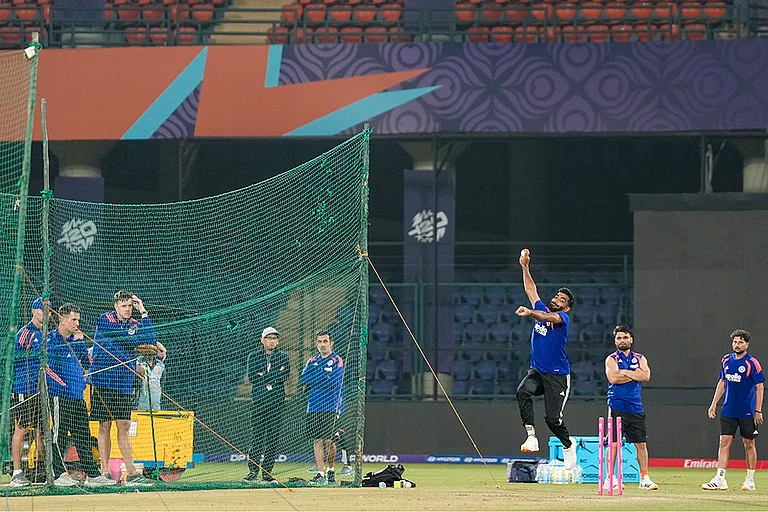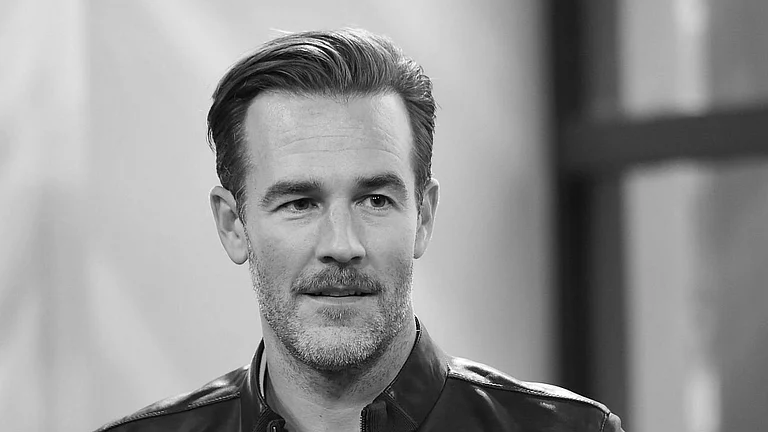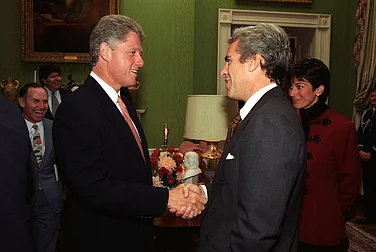Photographs of bombed public shelters, food being cooked on makeshift hearths, and leaflets with ominous threats to leave Gaza falling from the skies pop up unceasingly on Palestinian lawyer and activist Ahmed Bassiuni’s X (formerly Twitter) handle. On October 8, a day after the deadly Hamas attack in Israel, Ahmed was one of the thousands of Gazans to receive terse air-dropped text messages from the Israeli government, asking them to evacuate and leave Gaza immediately. At the time he thought the messages were absurd. But deep within, Ahmed knew that things were about to get much, much worse. And they did.
Soon, bombs came hurtling down on residential areas in the Gaza Strip. The enclaves turned to rubble. It has been over six weeks since. The duration has seen over 15,000 Gazans killed. About 60 per cent of these casualties have been women and children. Ahmed has, however, managed to survive one of the most brutal assaults on Palestinian soil in his lifetime.
On November 20, Ahmed survived the massacre at Dar Al-Basiouni in Beit Hanoun, a city located to the northeast of the Strip. “My family and I are still alive,” he said in a social media post to reassure his loved ones. But on November 25, on the first day of the ‘truce’—a four-day ceasefire for exchange of hostages and prisoners— Ahmed got news of death.
As both sides braced for the exchange, Ahmed announced the death of his nephew Diab, along with his cousins Yasser and Adam. “My sister’s son (Diab) is a 15-year-old child. The army arrested him the day before yesterday on Salah al-Din Street while he was travelling with his family from northern Gaza”. His brother, Yamen, has been missing for two weeks.
Ahmed is among the thousands of people living in nightmarish conditions for nearly two months since Israel’s offensive.
However, the Doha Institute-educated scholar refuses to leave Gaza. “We will not repeat (what happened at) Nakba again. I will not tell the stories of displacement and bombing to my children as our grandparents did to us. My family and I have decided to stay,” he says.
The United Nations Relief and Works Agency estimates that 1.7 million people from Gaza’s 2.3 million population are now displaced. Over 35,000 Gazans are wounded, while 60 per cent of Gaza has been “flattened” which means that the region’s fuel resource is over and virtually every water and sanitation plant has been destroyed. The healthcare system, which was already stretched before October 7, has now completely collapsed. There is less than a litre of water available to Gazans a day and hardly any food, according to the agency.
Israeli Prime Minister Benjamin Netanyahu has defended accusations of killing, starving, and dehydrating civilians in Gaza as “collateral damage”, which happens in “every legitimate war”. He has referred to the deaths and the destruction of the city as “unintended casualties”.
The term ‘collateral damage’ is an American euphemism that came into vogue during the Vietnam War as a crude justification for the deaths of civilians and destruction of civilian infrastructure. “That’s what Israel is doing in Gaza. It has tightened the preexisting blockade of Gaza into a more brutal siege, imposing a total blockade of food, water, fuel and other civilian items,” says Amitabh Behar, acting executive director of Oxfam, India.
While every country has the right to protect its citizens, it must be done within the bounds of international law, Behar says. “Cutting off borders and food and water for an entire population who are trapped in Gaza and unable to seek safety is a violation of those laws,” he states. Even the pre-existing blockade, declared illegal by both the International Committee of the Red Cross (ICRC) and the UN, was and continues to be collective punishment, according to the Oxfam India official.
“There are premature newborn babies now dying of hypothermia and preventable infections, traumatised mothers who have fled on foot from bombs into overcrowded shelters where they’ve not had any professional help or medicines. Premature births are up by a third. There are 50,000 pregnant women in Gaza. These are just some numbers,” he states.
Working in occupied Palestinian territory since the 1950s, Oxfam has been addressing humanitarian challenges amid such escalations in Gaza. The crisis, Behar adds, persists due to years of blockade, military occupation, denial of Palestinian rights, and cycles of violence. “Israel restricts food flow, using starvation as a weapon,” claims Behar.
A visibly shaken Farhat Mantoo, Médecins Sans Frontières (MSF) Executive Director, South Asia, adds that the way the Israeli government behaves with Palestinians will set the international standard for human rights violations in times of conflict. “What we are seeing now is unprecedented. History will remember this,” she states while highlighting the attacks on healthcare and aid workers. About 300 MSF staff, including Palestinians and foreign nations, are currently in Gaza.
“There is sewage flowing everywhere; there is no clean water available. Even our staff has been reporting incidents of not having sufficient drinking water, dehydration and starvation. We have lost many,” Mantoo states, adding that only a total ceasefire would facilitate sufficient assistance to those who need it most.
On November 21, two MSF doctors, Mahmoud Abu Nujaila and Ahmad Al Sahar and a third doctor, Ziad Al-Tatari were killed following a strike on Al Awda Hospital. Before that, a lab technician working with MSF, Mohammed Al Ahel, was killed on November 6 when his home at Al Shate Refugee Camp collapsed amid airstrikes in the vicinity.
Mantoo says that while the death toll could be counted, the impact of the siege on civil society as well as the people of Gaza, especially the youth, is devastating. “We are seeing an increase in the demand for women’s pills as young women don’t want to menstruate in Gaza as there is no water,” she states.
Targeting of healthcare and aid workers has compounded challenges for MSF, which has been working in Gaza and occupied Palestinian territories since the 1980s. An MSF evacuation convoy, despite agreement, was attacked on November 18, resulting in two casualties. This, despite long negotiations and an agreement between MSF and both parties to the conflict with regards to this movement.
Mantoo insists that a four-day ceasefire isn’t sufficient to fix Gaza’s healthcare crisis. She urges a total ceasefire and lifting of Israel’s blockade to facilitate vital humanitarian aid.
In Gaza’s collapsed healthcare system, dedicated doctors face dire conditions. Delivering babies, running ICUs without electricity, treating burn victims and performing surgeries without anaesthesia—all while trapped inside hospitals, aware of their own injuries and potential death. “These are the real stories we are getting from our medical staff,” adds Sana Beg, MSF’s Director of Communications, South Asia.
Oxfam’s Behar notes that the humanitarian pause in Gaza is insufficient, providing only temporary relief. He emphasises the need for a permanent ceasefire for lasting humanitarian solutions.
“The pause brings relief for Israeli families with hostages and Palestinian families awaiting the return of arbitrarily detained loved ones. Gazans will get time to find, bury and mourn their dead loved ones. But the number of trucks, litres of fuel and limited respites are poor proxies for the dignity and survival of Palestinians. Governments are hiding behind the smokescreen of humanitarianism while Israel carries out its campaign of collective punishment,” he states.
In the past six weeks, millions of people have taken to protest across the world against what many are now calling a genocide of the Palestinian people. An estimated 5,500 children have been killed in the Gaza Strip since October 7, according to Gaza’s government media office. It means that a child has been killed every ten minutes.
A fortnight ago, in a telling moment, a group of children taking shelter in Al Shifa Hospital held a press conference after an ambulance outside the hospital was bombed, killing 15 people. The children implored the world to save them from bombs. “Since October 7, we’ve faced extermination, killing, bombing over our heads – all of this in front of the world,” one of them said.
“We want shelter, food, and education and we want to live as the other children live,” the child said, first in Arabic and then in English. “We want to live, we want peace.
And we want judgment for the killers of children”.
Meanwhile, the people of Gaza have been learning how to live with the possibility of constant death, and a “humanitarian pause” does not mean much to them. “The problem is that people in Gaza are afraid of calm. Because after the calm comes the rage of the occupation army,” Ahmed Bassiuni writes.
Nowadays, Gazans like him who have decided to stay back at home and risk getting bombed don’t lock their doors anymore, because locked doors get compressed when bombs drop in the vicinity, preventing people from evacuating. Ahmed shares such tips on his X account.
Ahmed also speaks of a Bedouin in northern Gaza who has nicknamed his donkey ‘Biden’ because of the beast’s pristine white skin. The Bedouin hopes that the West will see the donkey and intervene to stop this genocide, if not for the sake of people of all colours in Gaza, then at least for the sake of ‘Biden’, the white-coloured ass.
(This appeared in the print as 'Too Little, Too Late')


























